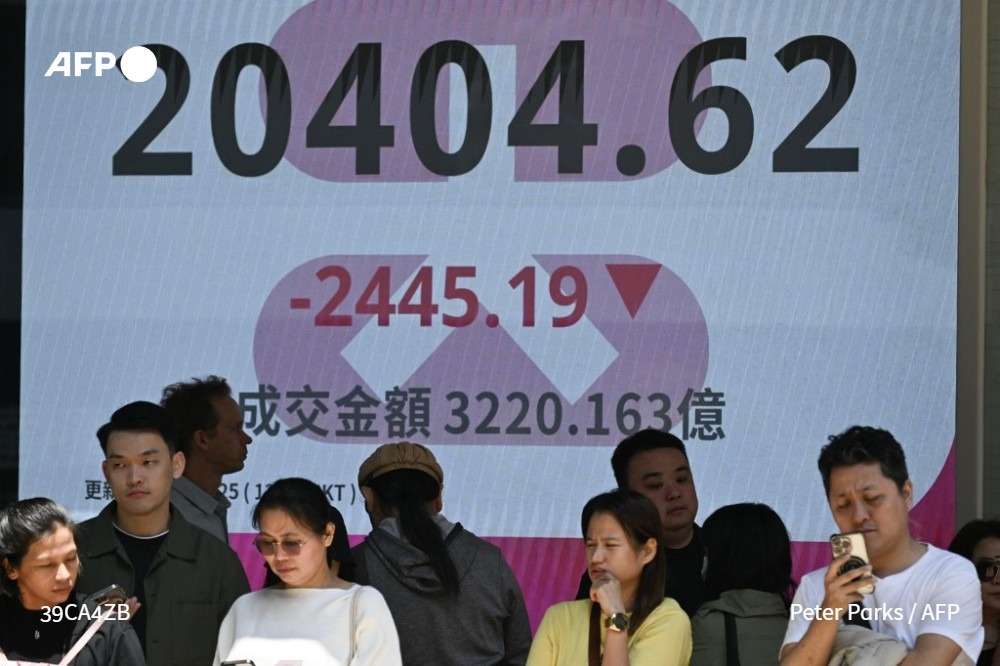Fears of global recession rise as Asian and European equities suffer historic losses
Stock markets across Asia and Europe suffered catastrophic losses on Monday after China announced sweeping retaliatory tariffs against the United States, prompting widespread investor panic and fears of a global recession.
Hong Kong’s Hang Seng Index plummeted by a staggering 13.22%, its worst single-day fall in nearly 30 years. The financial carnage rippled across the region, with Frankfurt tumbling 10%, Taipei diving 9.7%, and Tokyo shedding nearly 8%. European bourses mirrored the collapse, while futures for Wall Street pointed to a continued sell-off in American markets.
The turmoil followed an announcement late on Friday—after Asian markets had already closed—that Beijing would impose a retaliatory tariff of 34% on all US goods, effective from 10 April. The move is a direct response to US President Donald Trump’s decision last week to unveil a sweeping tariff regime targeting a range of America’s trading partners.
President Trump had justified the measures by accusing foreign governments of exploiting the United States in trade deals, claiming: *”We’ve been ripped off for years. The time has come to put America first.”* He also asserted that countries were now “lining up to cut deals” with Washington under the pressure of the new tariffs.
However, Beijing’s swift and uncompromising response has deepened fears that the world’s two largest economies are locked in a rapidly escalating tit-for-tat that could derail global growth.
Monday’s losses marked one of the darkest days for global equities since the 2008 financial crisis. Panic swept trading floors across Asia, with analysts describing the atmosphere as “chaotic” and “shell-shocked”.
“Investors are fleeing risk assets in droves,” said Alicia Wang, an equity strategist at Shanghai Global Advisors. “This is not just a tariff tit-for-tat anymore. It’s a full-blown economic confrontation with potentially global consequences.”
Commodities were also caught in the crossfire, with oil, copper, and agricultural futures all suffering sharp declines. Safe-haven assets such as gold and government bonds saw modest gains, reflecting investor flight from risk.
European markets opened sharply lower and remained under intense pressure throughout the day. Frankfurt’s DAX lost 10%, while Paris and London registered steep declines amid growing fears that European exporters could also be caught in the crossfire.
Economists warned that if the situation continues to deteriorate, the global economy could slip into recession.
“Both sides are digging in,” said Professor Henrik Möller, a trade economist at the University of Copenhagen. “And as the world becomes increasingly intertwined, the ripple effects will be severe and far-reaching. Supply chains are already under strain, and businesses are paralysed by uncertainty.”
Despite the growing alarm, there was little indication from either Washington or Beijing that a climbdown is imminent. President Trump remained defiant over the weekend, tweeting: “Trade wars are good, and easy to win.”
China’s Ministry of Commerce, meanwhile, accused the US of “economic bullying” and vowed to defend Chinese interests “at any cost”.
With both sides refusing to back down, markets are bracing for further volatility in the coming days. Investors and analysts alike are now calling for urgent diplomatic intervention to prevent the economic standoff from spiralling into a full-scale global crisis.
For now, the world watches anxiously as two economic giants dig in their heels—while global markets continue to bleed.
Get a premium automobile insurance coverage for your vehicle for as low as #15000 only and claim up to #3,000,000 in damages @Zenith Insurance To signup: WhatsApp/Call: +2349028313757








